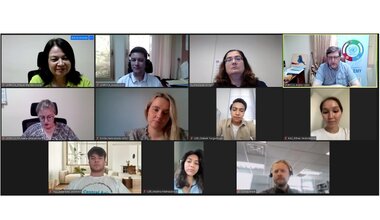SECRETARY-GENERAL'S OPENING REMARKS AT PRESS CONFERENCE TO LAUNCH “UNITED IN SCIENCE 2020” CLIMATE REPORT
New York, 9 September 2020
Thank you very much. Ladies and Gentlemen of the media,
I am pleased to join Professor [Petteri] Taalas of the World Meteorological Organization for this launch of United in Science 2020, a multi-agency compilation of the latest climate science.
Professor Taalas will walk through some of the details but let me say a few words from the outset.
This report is a catalogue of a climate crisis that is worsening by the hour.
Yes, economies slowed down because of COVID-19, but the heating of our planet has not let up.
As the report shows, greenhouse gas concentrations reached new record highs in 2020.
The last time levels were this high was between 2.6 and 5.3 million years ago, in the Pliocene era when there were trees at the South Pole and sea levels were some 20 metres higher.
The five-year period since the signing of the Paris Agreement on Climate Change will be the hottest on human record -- with average global temperatures of 1.1°C above pre-industrial levels.
The report also rings the alarm that there is a significant and growing chance of temporarily reaching the 1.5-degree threshold in the coming five years.
Over the same period, the extent of Arctic and Antarctic sea ice has been below average and sea level rise has been accelerating due to melting land-based ice.
The latest data for Greenland alone shows an average loss of ice mass of 278 billion tons a year – more than 110 million Olympic sized swimming pools. And this is Greenland alone - 110 million Olympic sized swimming pools have lost ice in Greenland alone. Let’s not forget that there is Antarctica. Let’s not forget that there are glaciers all over the world.
Over the next five years, the Arctic is predicted to continue warming at over twice the overall global rate.
Our world remains off track -- far off track -- to meet the objective of the Paris Agreement to limit global temperature rise to 1.5 degrees Celsius. If things would remain as they are, we would go up 3 to 5 degrees above the pre-industrial level.
As this report emphasizes, short-term lockdowns are no substitute for the sustained climate action we need to meet the goals of the Paris Agreement.
The consequences of our failure to get to grips with the climate emergency are everywhere.
Record heatwaves.
Devastating wildfires, floods and droughts.
And these challenges are only going to get worse.
As this report emphasizes, because of past emissions, we are locked into further heating.
There is no time to delay if we are to slow the trend and limit temperature rise to 1.5 degrees.
Climate action is the only way to ensure a liveable planet for this and future generations.
Whether we are tackling a pandemic or the climate crisis, it is clear that we need science, solidarity and decisive solutions.
We have a choice: business as usual, leading to further calamity; or we can use the recovery from COVID-19 to provide a real opportunity to put the world on a sustainable path.
That is why I have called for six climate-related actions to shape the recovery.
First, as we spend huge amounts of money to recover from the coronavirus, we must deliver new jobs and businesses through a clean, green transition.
Second, where taxpayers’ money is used to rescue businesses, it needs to be tied to achieving green jobs and sustainable growth.
Third, fiscal firepower must drive a shift from the grey to the green economy and make societies and people more resilient.
Fourth, public funds should be used to invest in the future, not the past, and flow to sustainable sectors and projects that help the environment and the climate.
And so, fossil fuel subsidies must end, polluters must pay for their pollution, and no new coal power plants should be built.
It is already cheaper to build new renewable energy capacity than to continue operating 39 per cent of the world’s existing coal capacity.
This share of uncompetitive coal power plants will rapidly increase to 60 per cent in 2022.
The coal business is going up in smoke.
Fifth, climate risks and opportunities must be incorporated into the financial system, as well as all aspects of public policymaking and infrastructure.
And, lastly, we need to work together as an international community.
These six principles constitute an important guide to recovering better together.
As we work to tackle both the COVID-19 pandemic and the climate crisis, I urge leaders to heed the facts in this report, unite behind the science and take urgent climate action.
And I call on governments to prepare new and ambitious national climate plans, the Nationally Determined Contributions, in advance of COP26.
That is how we will build a safer, more sustainable future.
 UN
UN




